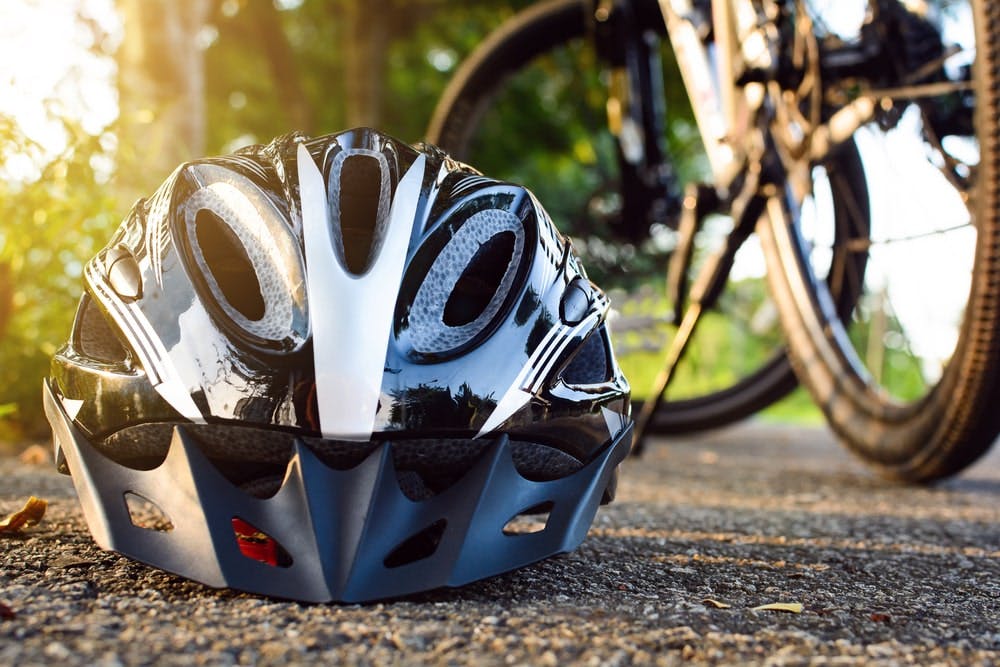
Georgia is a biker and bicycle-friendly state, with several laws protecting riders’ rights; however, some roads can be dangerous to ride on. In addition, you never know when you will encounter a reckless driver. Therefore, it is best to wear a helmet to protect yourself from serious injuries from an accident. A bike helmet might not offer protection to all parts of your body in an accident, but it can prevent you from sustaining any serious head injuries. Georgia also has some laws that help enforce the wearing of helmets for motorcyclists and bicyclists. Continue reading to learn more about bike and
Source: Health Matters
Are Helmets Mandatory In Georgia?
Typically, all cyclists and motorcycle operators in the state, including passengers, are required by law to wear helmets. However, in most states, including Georgia, only bikers under a certain age are required to wear helmets on bicycles.
According to research, wearing protective headgear can make a significant difference in helping prevent severe injuries in accidents involving bicycles or motorcycles. Georgia laws require every rider to wear a helmet to reduce the potential risk of traumatic brain injuries and to promote public safety.
Is It Illegal to Ride a Bicycle on the Sidewalk In Georgia?
The Georgia bicycle laws also entail that riders above the age of 12 are not permitted to ride a bicycle on the sidewalk. But in some cases, if the local ordinance allows it, bicyclists over 12 years old can ride their bikes on the sidewalk.
There are exclusive bicycle lanes all across the state for bicycle riders. In addition, traffic laws in Georgia ensure bicycle safety by requiring all motor vehicle drivers to yield to bike riders in the bicycle lanes and reduce the potential risk of bicycle accidents.
How Old Should You Be to Wear A Bicycle Helmet In Georgia?
While it is a good idea to wear a bicycle helmet and protective headgear when riding a bicycle, Georgia’s bicycle helmet laws do not require people above the age of 16 to wear bicycle helmets when riding the bike.
Minors (age 15 or less) are required to wear bicycle helmets on all bike paths and bike lanes in the state. They can also be required by Georgia bicycle laws to wear helmets on highways for highway safety and on sidewalks unless a local ordinance suggests otherwise.
Bicyclists under the age of 16 should wear bicycle helmets that are properly fastened to reduce the impact of a potential bike accident. According to Georgia’s bicycle laws, a person under the age of 16 cannot be fined or imprisoned for not wearing protective headgear or a bicycle helmet. However, their parents could be charged with a misdemeanor for not equipping their child with appropriate safety equipment.
While you might not be legally required to wear a helmet on a bicycle in Georgia above the age of 16, it can still offer you protection in serious bicycle accidents. When a bicycle accident occurs, the biggest threat to a bicyclist is the lack of headgear because it can lead to traumatic brain injuries.
Can You Be Deemed Negligent for Not Wearing a Bicycle Helmet?
Equipping yourself with a bicycle helmet can save your life in a serious bicycle accident and prevent the opposing party from blaming you for not wearing protective gear.
For example, in personal injury lawsuits involving bicycle accidents, motor vehicle operators can try to shift the blame on the victim to fend off paying for the damages.
It is a bicycle accident victim’s right to recover compensation for their injuries. However, if you get involved in a bicycle accident and seek to sue the at-fault driver, the defense attorney can blame you for not wearing a helmet while biking.

What are the Standard Requirements for Motorcycle Helmets and Headgear In Georgia?
The requirements for helmets and headgear are also governed under the Georgia helmet laws. According to this law, a bike helmet should meet certain criteria, such as having adequate penetration resistance, energy absorption, and system effectiveness to protect the operators in case of a severe accident.
The headgear should not have anything extending beyond an inch of its shell and should be U.S. Department of Transportation (DOT) approved. The DOT sticker should be placed along with the manufacturer’s information. Helmets that meet the DOT-approved criteria would weigh around 3 pounds, have polystyrene foam on the inside, and have a sturdy chin strap.
Eyeglasses or other motorcycle eyewear, such as helmet goggles and visors that reduce the impact of the sun, are not allowed to be worn by motorcycle operators because they can increase the chances of a motorcycle accident.
All eye-protected devices worn by motorcyclists should be approved by the Commissioner of Public Safety. Bike helmets with internal speakers are only permissible when used for communication purposes. Motorcycle helmets should cover the entire face of the rider.
What Is the Fine for Not Wearing a Motorcycle Helmet In Georgia?
A person who disregards these helmet laws and does not wear a helmet can get a no-helmet ticket, which has a penalty from $50 to $200. In addition, not wearing motorcycle helmets can also have other penalties under the Georgia helmet laws. For instance, not wearing motorcycle helmets is considered a misdemeanor under the law, and violators can be fined up to $1000. Additional penalties can include public community service and a jail sentence.
What are the Exceptions to Georgia’s Bicycle Helmet Law?
Regardless of age, experience, or insurance coverage, you should wear a motorcycle helmet as a rider. However, there can be a few exceptions to the motorcycle helmet law. For example, riders or passengers in enclosed motorcycle cabs or motorized carts would not be required to wear headgear in Georgia. Bike helmets are also not required by people on three-wheeler motorcycles typically used for agricultural and farming purposes.
Is It Illegal to Ride a Motorcycle Without a Helmet In Georgia?
The rate of motorcycle accidents across the U.S. is much higher than accidents involving motor vehicles, meaning that motorcycles can be far more dangerous to drive than other vehicles. To protect riders from catastrophic injuries, the state of Georgia has made it illegal for motorcycle operators to ride without helmets. Many motorcycle accident cases resulting in severe injuries, such as traumatic brain or spine injuries, involve operators not wearing a motorcycle helmet.
While the traffic laws in Georgia do not require bicycle riders to wear helmets, they require motorcyclists to be equipped with helmets and additional safety gear. People who do not comply with these state laws can receive an official warning from the authorities and a no-helmet ticket. In addition, riding a motorcycle without safety equipment, such as headgear, can be a serious traffic violation that could add points to your license.
Suppose you get involved in a severe motorcycle accident and were not wearing a helmet at the time of the accident. In that case, you could be deemed liable for the accident, and the compensation for your traumatic injury case could be reduced.

How Does Not Wearing a Motorcycle Helmet Affect My Personal Injury Lawsuit?
It is against the law to ride a motorcycle without a helmet in Georgia. This means that ignoring helmet laws can be a traffic violation. Protective headgear could lessen the impact of the collision or protect you from suffering serious injuries, which is why you could lose the right to obtain any compensation for your damages if you were not wearing a motorcycle helmet.
Even if you suffer serious injuries in a motorcycle accident due to the lack of headgear, you can be deemed partially at fault. This is because Georgia is one of the many states in the U.S. that follow the comparative negligence rule. According to this rule, when you are found to have a shared fault in an accident, your compensation is reduced to your fault in that accident.
In comparative fault, the plaintiff has a right to obtain compensation if they are less than 50% at fault for the accident. However, every motorcycle accident case is unique. In your case, if the judge or jury finds that your failure to wear headgear or an appropriate helmet made you 50% or more at fault in the accident, you might not be able to recover any compensation.
It is also possible for injured motorcyclists to get a low settlement offer in their personal injury claim from their insurance company due to their failure to wear a helmet in the accident.
How Can a Motorcycle Accident Lawyer Help?
If you get involved in a motorcycle accident where you were not wearing a helmet, here is how a lawyer from the Pendergrass Law Firm can help you:
- We can stop you from making any remarks that let the insurance company or the defense of the at-fault driver impose fault on you.
- Your lawyer could help you gather evidence and build a solid case against the opposing party.
- If settlement negotiations are unsuccessful, your lawyer can help you file a lawsuit against the liable party and recover full compensation for your damages as a result of someone else’s negligence


